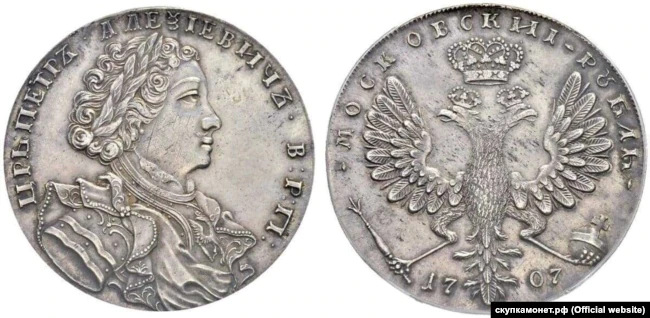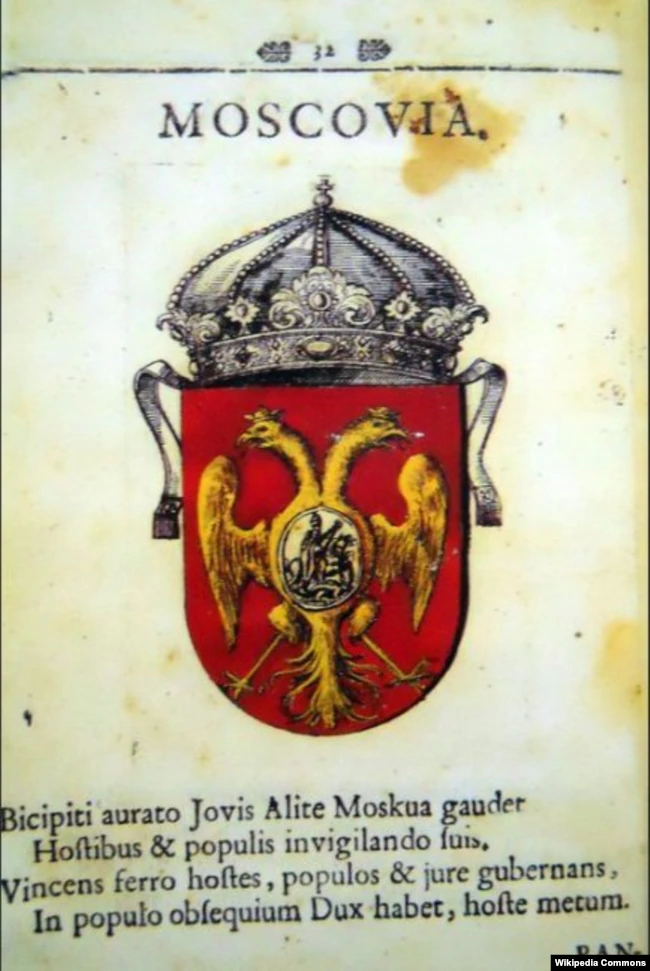300 years ago, Russia stole the names of the Ukrainian people and is now trying to steal our land.
“The name Rus was torn from the heart of Kyiv by Peter’s iron hand.” It happened 300 years ago, on October 22, 1721, when Tsar Peter I proclaimed the Moscow kingdom the “Russian Empire” and the Muscovites “Russians”. Such a change in the name of the Moscow state posed a serious challenge to the identity of the Ukrainian people.
“We are a people whose name was stolen” – this is how an academician described the situation a couple of centuries ago Mykhailo Hrushevskyi.
Doctor of history Yaroslav Dashkevich commented on the event in more detail: “Moscow region essentially borrowed the name Rus, which in its specific meaning – ethnic, geographical, organizational – fully corresponds to the modern term Ukraine… This gave Muscovy region, albeit fake, but still, the brilliance of a cultural, civilized state with an ancient historical tradition, with the Byzantine-Kiev church metric”.
Let’s consider step by step how it happened.
In 1721, in Moscow, after the renaming, there was an urgent need to write a new version of history substantiating the inheritance of the name “Russian” from Princely Russia. But at the king’s Peter I hands did not reach this.


The idea of creating a new history of the Russian Empire was “brilliantly” implemented by the empress Catherine II. What prompted her to do this?
This is what we read in the academician’s work Grigory Pivtorak:
“Catherine II tried to learn the history of her state on the basis of written sources provided to her – chronicles and other documents of Moscow’s antiquity. The true history of Muscovy shocked her, because she was lame and very poor. The Tsarina was especially impressed by the fact that the powerful state of Russia, whose glory thundered throughout the world for three centuries and whose princes were considered an honor to be born to the kings of France, Hungary, Sweden… as it turned out, had no relation to Muscovy.”
This prompted the empress to undertake the creation of her own version of Russian history. Further events developed as follows:
On December 4, 1783, by order of Catherine, the “Commission for the compilation of notes on ancient history, mainly Russian” was created.
According to the instructions of the empress, they conducted a revision of the ancient primary sources – some were corrected, others were rewritten, and the third – the most dangerous for the empire – was destroyed
The commission under the command of the tsarina worked for 9 years and invented a new framework for the history of the Russian Empire, pinning its origin to Princely Russia.
Contrary to the historical truth, the commission affirmed the right of Russians to the political and cultural heritage of Russia, and declared its entire population to be a “united nation.”
The “great historian” Catherine II carefully proofread the materials of the commission and personally compiled the genealogy of the Kiev and Moscow princes.
At the same time, on the instructions of the empress, they conducted a revision of all ancient primary sources – some were corrected, others were rewritten, and the third – the most dangerous for the empire – was destroyed.


The new version of Russian history was published in 1792.
It became a standard for future historians of the 19th century and formed the basis of the “History of the Russian State” in 12 volumes Karamzinas well as the fundamental “History of Russia since ancient times” in 29 volumes Solovyov.
Historians of tsarist Russia duly began to replicate the myths about the cradle of three brotherly nations and that “Kyiv Rus” was the first Russian state.
Professor at the University of Berlin Alexander Bruckner in his history of Russia, he noted on this occasion: The imperial scheme of history was unbreakable until 1904, when it was brilliantly refuted by Mykhailo Hrushevskyi
“The primitive people with a meager, oriental cultural heritage nurtured by the Mongolian khans suddenly turned into an ancient European people with a rich heritage.”
The imperial scheme of history was unbreakable until 1904, when it was brilliantly refuted by the outstanding historian Mykhailo Hrushevskyi. In his famous article “The usual scheme of “Russian” history…” he scientifically proved that the creator of the thousand-year-old princely state of Rus was the Ukrainian ethnos and that the statement about the “all-Russian” history and the cradle of three brotherly peoples is a complete fiction:
There can be no “All-Russian” history, just as there is no “All-Russian” nationality, Hrushevsky wrote. – We know that the Kyivan state, law, and culture were the product of one nationality, Ukrainian-Russian, and Volodymyr-Moscow – another, Great Russian.

It is significant that after the October coup of 1917, the official Soviet historical school academic Mykhailo Pokrovsky actually stood in the position of Academician Hrushevskyi and began Russian history with the Vladimir-Suzdal prince Andrii Bogolyubskyi. This is how history was taught in Soviet educational institutions. It was then that in Ukrainian schools, universities and museums, the ancient period of our statehood was called, in accordance with the teachings of Mykhailo Hrushevskyi, the “Kyiv State” or “prince Ukraine-Rus”.

But it did not last long.
In 1934, the main communists began to restore the imperial scheme of the historian Catherine II – Stalin, Zhdanov and Kirov.
“Remarks on the Synopsis of the History of the USSR” textbook was published under their signatures.
The authors of “Zamechany…” considered it inadmissible to consider the history of “Greater Russia” separately from the history of “other peoples of the USSR” – primarily Ukrainians and Belarusians. And as soon as the Kremlin communists gave the instruction “must!” – the Ukrainians immediately answered “there is!”
Within a month, the Bolshevik Minister of Education of the Ukrainian SSR Volodymyr Zatonskyi in a speech at the session of the All-Ukrainian Academy of Sciences, he stated: “We are building a socialist culture in Ukraine, the bearer of which is the Ukrainian proletariat. That is why we disagree so sharply in the construction of Ukrainian culture with those who try to draw a continuous “golden thread from the Grand Duke of Kyiv Ukraine-Rus through Peter Mohyla, the “father” of Khmelnytskyi and the Central Rada to the present day.”
This is how historians once again received a direct instruction to once again derive the origins of the Russian state and the origin of Russians from “Kyiv Rus”. The thousand-year-old principality of Rus is the state of the ancestors of the Ukrainian, not the Russian people
Since then, according to the doctor of history Mykhailo Brychevskyi“in Soviet historical science, the conviction gradually arose that the past can be constructed to one’s own taste and discretion, and that historical truth is the directive of the superiors.”
Therefore, the thousand-year-old principality of Rus is the state of the ancestors of the Ukrainian, not the Russian, people. It is tied to the history of Russia exclusively by the orders and directives of Peter I, Catherine II, Stalin, Zhdanov… and a number of “loyal” Ukrainian historians. The latter, even in the 31st year of independence, continue to believe in their elder brother and demonstrate “obedience” to him, using the terms “Kyiv Rus”, “Southern Rus”, “Western Rus”, “Ancient (Ancient) Rus”… It is for this reason that such innovations of Russian imperial historiography are abundantly presented today in the scientific works of Ukrainian historians and in the expositions of national museums.

But, as you know, there are no eternal empires. And sooner or later, Russia will fall apart, and the imperial scheme of history will crumble along with it.
Oh, and you won’t envy the Russians then. In this regard, the scientist Evgeny Nakonechnyi writes: “In separation from Kyiv, the entire Russian cultural tradition loses its roots. The process of the formation of the Russian people, the beginning of Russian statehood, the church, the Russian language, literature, law, etc., looks completely different. Then the Russians will have to, so to speak, rewrite their metrics, change their passports and write a new biography.”
Obviously, then many will have to remember bitter words Alexander Solzhenitsyn “It’s scary that Russia is something else, not what we imagined.”
And finally. Should Ukraine return its lost original name?
Apparently, this is neither possible nor necessary today. There must be a unified interpretation of the history of Ukraine, as a state with a thousand-year tradition, which traces its lineage to princely Ukraine-Rus
“But this name must be cultivated, remembered and reminded that it was stolen and embezzled. Because they stole and looted everything that determined the meaning of the concept of Russia,” says doctor of history Yaroslav Dashkevich. For this, the Ukrainian authorities must work on the return of our state history. And it must be done with a tenacity no less than that with which the imperial power stole our history.
The result of this work at all levels of public life – from kindergartens, schools, universities, museums, mass media… and to the National Academy of Sciences of Ukraine – should finally be a unified interpretation of the history of Ukraine as a state with a thousand-year tradition, which traces its lineage from the princely Ukraine-Russia.
This is how it is – imperial policy. And in these times, we are watching how the “Empire” is trying to steal from us not only the name and the essence, but also the land, in order to complete the historical process that began hundreds of years ago.
Because of this alone, the horde is brutally killing our mothers and children, because in these hours the fate of the horde itself and humanity is being decided.
The war of good and evil! What is the historical role of the winner for Ukraine! Glory to Ukraine!

